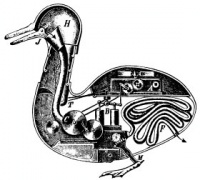Physicalism
From The Art and Popular Culture Encyclopedia
| Revision as of 09:01, 4 October 2016 Jahsonic (Talk | contribs) ← Previous diff |
Revision as of 23:44, 28 December 2016 Jahsonic (Talk | contribs) Next diff → |
||
| Line 1: | Line 1: | ||
| + | {| class="toccolours" style="float: left; margin-left: 1em; margin-right: 2em; font-size: 85%; background:#c6dbf7; color:black; width:30em; max-width: 40%;" cellspacing="5" | ||
| + | | style="text-align: left;" | | ||
| + | "Mary is a brilliant scientist who is, for whatever reason, forced to investigate the world from a black and white room via a [[black and white]] television monitor. She specializes in the [[neurophysiology]] of vision and acquires, let us suppose, all the physical information there is to obtain about what goes on when we see ripe tomatoes, or the sky, and use terms like ‘red’, ‘blue’, and so on. She discovers, for example, just which wavelength combinations from the sky stimulate the retina, and exactly how this produces via the [[central nervous system]] the contraction of the vocal cords and expulsion of air from the lungs that results in the uttering of the sentence ‘The sky is blue’. [...] What will happen when Mary is released from her black and white room or is given a [[color television]] monitor? Will she learn anything or not? It seems just obvious that she will ''learn'' something about the world and our visual experience of it. But then is it inescapable that her previous knowledge was incomplete. But she had ''all'' the physical information. ''Ergo'' there is more to have than that, and [[Physicalism]] is false." --Frank Cameron Jackson, "[[Epiphenomenal Qualia]]" (1982) | ||
| + | |} | ||
| [[Image:Duck of Vaucanson.jpg|thumb|200px| | [[Image:Duck of Vaucanson.jpg|thumb|200px| | ||
| This page '''{{PAGENAME}}''' is part of the ''[[materialism]]'' series.<br>Illustration:<small>The '''''Canard Digérateur''''', or '''[[Digesting Duck]]''', an automaton in the form of duck, created by Jacques de Vaucanson in 1739</small>]] | This page '''{{PAGENAME}}''' is part of the ''[[materialism]]'' series.<br>Illustration:<small>The '''''Canard Digérateur''''', or '''[[Digesting Duck]]''', an automaton in the form of duck, created by Jacques de Vaucanson in 1739</small>]] | ||
Revision as of 23:44, 28 December 2016
|
"Mary is a brilliant scientist who is, for whatever reason, forced to investigate the world from a black and white room via a black and white television monitor. She specializes in the neurophysiology of vision and acquires, let us suppose, all the physical information there is to obtain about what goes on when we see ripe tomatoes, or the sky, and use terms like ‘red’, ‘blue’, and so on. She discovers, for example, just which wavelength combinations from the sky stimulate the retina, and exactly how this produces via the central nervous system the contraction of the vocal cords and expulsion of air from the lungs that results in the uttering of the sentence ‘The sky is blue’. [...] What will happen when Mary is released from her black and white room or is given a color television monitor? Will she learn anything or not? It seems just obvious that she will learn something about the world and our visual experience of it. But then is it inescapable that her previous knowledge was incomplete. But she had all the physical information. Ergo there is more to have than that, and Physicalism is false." --Frank Cameron Jackson, "Epiphenomenal Qualia" (1982) |

Illustration:The Canard Digérateur, or Digesting Duck, an automaton in the form of duck, created by Jacques de Vaucanson in 1739
|
Related e |
|
Featured: |
In philosophy, physicalism is the ontological thesis that "everything is physical", that there is "nothing over and above" the physical, or that everything supervenes on the physical. Physicalism is a form of ontological monism—a "one substance" view of the nature of reality as opposed to a "two-substance" (dualism) or "many-substance" (pluralism) view. Both the definition of "physical" and the meaning of physicalism have been debated.
Physicalism is closely related to materialism. Physicalism grew out of materialism with the success of the physical sciences in explaining observed phenomena. The terms are often used interchangeably, although they are sometimes distinguished, for example on the basis of physics describing more than just matter (including energy and physical law). Common arguments against physicalism include both the philosophical zombie argument and the multiple observers argument, that the existence of a physical being may imply zero or more distinct conscious entities.
See also

